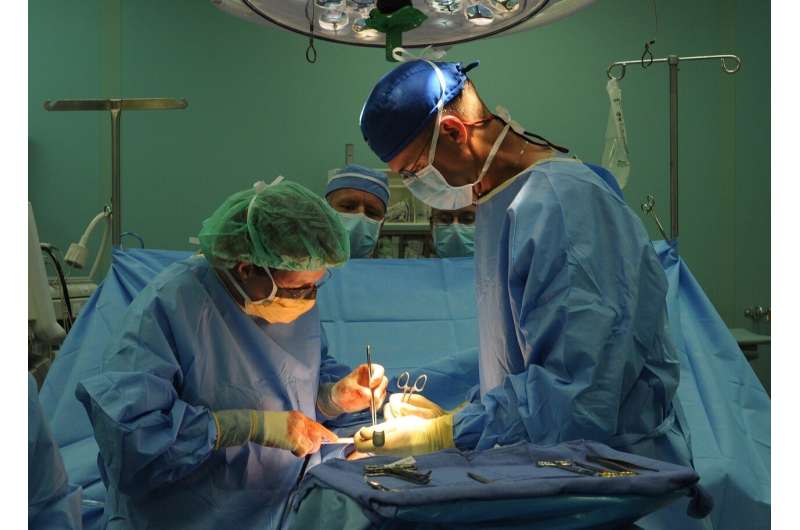Surgeons develop universal patient-reported outcomes tool to improve hernia care

Patient-reported outcomes have become a critical part of improving surgical care because of their ability to capture patient experiences, such as quality of life and satisfaction, that can help inform treatment. However, for patients undergoing abdominal hernia repair—a common procedure performed on about 400,000 patients a year in the United States—a tool to effectively and practically measure those outcomes has not been widely accepted and implemented by clinics.
Now, researchers from the division of Plastic Surgery in the department of Surgery in the Perelman School of Medicine at the University of Pennsylvania, have successfully developed, tested, and implemented a first-of-its-kind, patient-informed questionnaire tool for ventral hernia repair surgery patients that could be broadly used to improve the way clinicians care for patients and potentially outcomes.
The findings were reported online in the Annals of Surgery.
“By listening to the voices of patients and transforming that into an objective instrument that not only measures and quantifies outcomes from their standpoint but is also reproducible, we are able to capture the things that often go overlooked and aren’t documented,” said senior author John P. Fischer, MD, MPH, an associate professor of Surgery at Penn and director of the Clinical Research Program in the division of Plastic Surgery. “By measuring these outcomes, like pain, function, and body image, we are deepening our understanding about who does well and will ultimately be able to make better shared decisions about which treatment approach is most appropriate for which patients.”
An abdominal, or ventral, hernia is a bulge of tissues through an opening of weakness within the abdominal wall muscles. They are a common, chronic surgical problem facing any patient undergoing abdominal surgery. Although traditionally thought of as a simple surgical issue, clinicians have come to recognize it as a complex, multi-dimensional disease. For instance, patients with ventral hernias experience negative effects on whole-body fitness, creating significant downstream effects, including restricted motion, increased pain, and difficulties completing activities of daily living. It can also lead to adverse effects on psychosocial well-being and a negative impact on body image and mental health.
The tool, which is known as Abdominal Hernia-Q (AHQ) and is being implemented across hernia surgery clinics at Penn Medicine, has been more than five years in the making, as it underwent rigorous testing and validation in the clinical setting with more than 400 patients and researchers from multiple disciplines.
It’s both practical and efficient, the authors show, taking less than 70 seconds to complete the pre-op questions and less than three minutes for the post-operation questions. Older patients took longer to complete the questions, but no differences in time to completion were observed across race, ethnicities, and incomes.
For the study, all pre-operative and over six-month post-operative patients completed the questions on an iPad: six questions for pre-op and 16 questions for post-op. The tool captures physical issues that include but are not limited to how the patient is able to achieve tasks at work or home, pain issues, how they look and feel, sexuality, and their clinical care team experience.
The researchers psychometrically validated the tool by correlating it with clinical outcomes and data from other available patient reported outcome instruments over a year after surgery, and through re-testing.
The Penn tool improves upon others in several ways. It provides both pre-operative and post-operative instruments, with a simple scoring system, allowing for easy-to-interpret quality-of-life data, covers body image and satisfaction with surgical care, and was developed with input from not only patients but also their families, nurses, and clinicians. The tool is also more sensitive to negative clinical outcomes, with significantly lower scores for patients who had 30- and 90-day complications, readmissions, and importantly, recurrence.
“It’s extremely reliable in capturing information and aspects of quality of life that are important in hernia repair,” said Viren Patel, a fourth-year Penn medical student pursuing a career in Plastic and Reconstructive Surgery, and first author on the paper. “And because of the short amount of time it takes to complete, it won’t get in the way of clinical flow.”
Time to complete patient-reported outcomes has remained a barrier for collecting such measurements in the clinic.
More accurate patient-reported outcomes will help clinicians better determine who is a candidate for surgery, counsel patients about the benefits and risks, and perform operations, which will lead to higher value clinical care, the authors said.
The Penn AHQ instrument is currently available online for use and implementation into surgical clinical practices.
Source: Read Full Article


